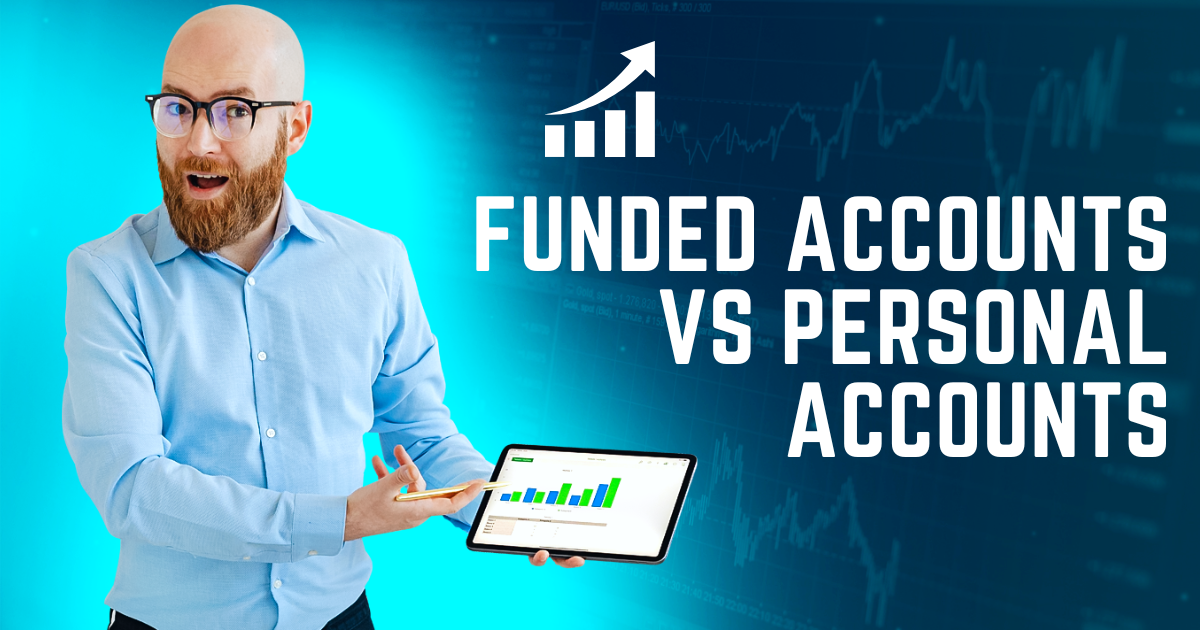
Funded Accounts vs Personal Accounts: Which Is Right for You? (2025 Guide)
The trading world offers two main paths for retail traders:
- Trading with personal accounts (using your own capital).
- Trading with funded accounts provided by prop firms.
Both come with unique risks, benefits, and challenges. Choosing the right one depends on your goals, risk appetite, and trading discipline. In this 2025 guide, we’ll break down the differences, highlight real trader feedback, and show you how to decide which is best for you.
🔑 What Is a Funded Trading Account?
A funded account is money allocated to you by a proprietary trading firm (prop firm) once you pass their evaluation challenge. The firm provides capital—often ranging from $10,000 to $200,000+—and in return, you share profits (commonly 80–90% for the trader, 10–20% for the firm).
- Examples of prop firms: FTMO, MyFundedFutures, Topstep, Bulenox, and The 5%ers.
- Trader Feedback: According to Trustpilot reviews for FTMO, most users value the access to large capital and fast payouts, but some complain about strict rules like drawdowns.
✅ Key Advantage: You trade with other people’s money, not your own.
❌ Key Limitation: Must follow the firm’s rules (profit targets, drawdowns, news restrictions).
🔑 What Is a Personal Trading Account?
A personal account means you fund your trading account entirely with your own capital. For example, you might deposit $1,000–$10,000+ into a broker account and trade without restrictions.
- Trader Experience: On Reddit’s r/Forex, many traders argue personal accounts offer freedom but also higher emotional stress since every dollar lost is your own.
✅ Key Advantage: Full independence—no external rules.
❌ Key Limitation: You carry 100% of the risk.
📊 Funded vs Personal Accounts: Quick Comparison Table
| Factor | Funded Account | Personal Account |
|---|---|---|
| Capital Access | $10k–$200k+ (provided by firm) | Limited to your savings |
| Rules & Limits | Strict (drawdowns, scaling, profit targets) | No restrictions |
| Profit Split | 70–90% trader / 10–30% firm | 100% yours |
| Risk | Firm bears financial risk | You bear all losses |
| Evaluation Required | Yes (challenges or trials) | No evaluation |
| Growth Potential | Can scale with firm funding | Depends on your capital |
| Psychological Pressure | Rule compliance stress | Financial loss stress |
| Costs | Evaluation fees ($100–$600) | Brokerage spreads/commissions only |
⚖️ Benefits of Funded Accounts
- Access to Large Capital
Even if you only have $500, passing a prop firm challenge can give you access to $50,000+. - Profit Opportunities
Some firms offer up to 90% profit splits (e.g., MyFundedFutures). - Professional Growth
You’re forced to follow risk management rules—helping you build long-term discipline.
📌 Source: According to Bulenox, their traders often scale from $25,000 to $250,000 accounts within months if they maintain consistency.
⚖️ Challenges of Funded Accounts
- Strict Trading Rules
- Daily/overall drawdown rules
- Prohibited strategies (like martingale, grid, or high-frequency arbitrage)
- No trading during major news events
- Evaluation Pressure
Many traders fail during the challenge stage due to unrealistic risk-taking.
📌 Source: Reddit discussions show that over 80% of applicants fail evaluations, often due to over-leverage.
- Profit Split
Unlike personal accounts, you don’t keep 100%.
⚖️ Benefits of Personal Accounts
- Full Control
You decide when and how to trade—no restrictions. - Keep 100% of Profits
No firm takes a cut. - Flexible Strategy
You can scalp, swing trade, hold overnight, or trade news events freely.
⚖️ Challenges of Personal Accounts
- Limited Capital
Most retail traders only start with $1,000–$5,000, limiting growth potential. - Psychological Stress
Losses feel heavier since it’s your own money. - No Safety Net
Once your account is wiped out, it’s gone.
📌 Source: A 2025 Finance Magnates report states that retail traders with small accounts (<$5,000) have a 76% higher chance of blowing up compared to funded traders with prop firm risk limits.
🧠 Psychological Differences
- Funded Account Stress: Following rules, avoiding violations.
- Personal Account Stress: Risking your own money.
👉 According to a 2025 article on Investopedia, psychological discipline is the main factor that determines success—not account type.
🚨 Red Flags to Watch for in Prop Firms
- No verified payout proof.
- Unrealistic profit splits (100% promised).
- Fake reviews on Trustpilot or Reddit.
📌 Example: In early 2025, traders on Reddit r/propfirms exposed several “fly-by-night” firms that shut down after collecting challenge fees without paying traders.
📝 Which One Should You Choose?
- If you have limited capital but solid discipline → Start with funded accounts.
- If you want full freedom and have savings to risk → Use a personal account.
- Many traders use a hybrid approach → Start with funded accounts, then reinvest profits into personal trading.
Read More: Common Mistakes Traders Make with Prop Firms (2025) and How to Avoid Them
📚 FAQs: Funded vs Personal Trading Accounts
Q1. Are funded accounts legit?
Yes, many are. Reputable ones like FTMO, Topstep, and Bulenox have verified Trustpilot ratings and payout proof.
Q2. Do I really need to pass a challenge?
Yes, most firms require it to prove you can manage risk before giving you real capital.
Q3. Can I make a living from funded accounts?
Possible, but rare. Only disciplined traders succeed long-term.
Q4. Which account type is better for beginners?
Funded accounts are safer for beginners with low capital, since losses don’t wipe out personal savings.
Q5. Can I use both at the same time?
Yes, many traders use funded accounts for growth while maintaining a personal account for freedom.

